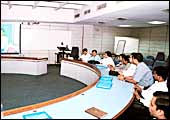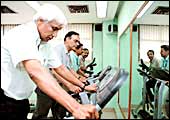 |
| NTPC's Jain and his team: With attrition
rate of just 0.4 per cent, the employees are definitely in
good company |
If
attrition rates and average service tenures were the only indicators
of employee satisfaction, then people at India's premier power
generation company, National Thermal Power Corporation (NTPC),
would easily top any happiness index for employees. With an attrition
rate of just 0.4 per cent and an average career tenure of 20 years,
it may well cause both tech start-ups and legacy majors to turn
green with envy.
Before you dismiss these figures as a function
of a public sector mindset-unambitious, laid-back and complacent-sample
this: alumni, freshers and search firms alike have an extremely
favourable view of the company; and competitors consider its hr
practices extremely robust. Proof: Anil Ambani poached K.K. Sinha,
its Director, HRD, in July this year. His brief: redesign Reliance
Energy's hr practices.
SNAPSHOT
REVENUES: Rs 26,517
crore (2004-05)
PROFITS: Rs 5,807 crore (2004-05) |
Total employees: 23,385
Attrition (per cent): 0.4 (2004-05)
Average career tenure: 20 years
(74 per cent)
Training budget (budgeted/ actual): Rs
1.13 crore
Training man-hours (actual): 1,611,952
(2004-05) |
Ask Vijay Kumar Gupta, gm (hr)-who has been
with NTPC for 26 years-why he's stayed with the company for so
long, and pat comes his reply: "I've had no reason to think
of moving." Not only has it given him full freedom to implement
various innovative hr practices, it has also taken full care of
all his needs. "Which company," he asks, "would
pay the full medical expenses of its employees, their families
and even dependent parents after retirement?" Adds Dinesh
Batra, Senior Manager, Corporate Planning: "It is NTPC's
ability to manage challenges and convert them into opportunities
that makes it such a great place to work in." For instance,
when it faced the problem of disposing of the residue ash from
its power plants, the NTPC team came up with the idea of selling
it as construction material (ash mixed with cement is used in
construction) in West Asia. "The plan was conceived and executed
in six months flat,'' adds Batra. Such nimble-footedness, popularly
attributed only to the private sector, adds to NTPC's draw as
an employer. "Employee satisfaction levels have jumped 20
per cent between 2001 and 2004 despite no major revisions in compensation
levels," says G.K. Agarwal, Executive Director, HRD. Interestingly,
the company conducts employee satisfaction surveys in-house every
year and gets an outside agency to do it once every four years.
 |
| NTPC sees training as an investment, which
means staff is always riding the learning curve |
But what really attracts fresh recruits to
NTPC are the learning opportunities and the chance to develop
all-round capabilities. "In NTPC, training is seen as an
investment. Hence, budget is not a constraint. Last year the training
budget was Rs 1.5 crore," says Swatantra Kumar, gm and Head
of the company's Gurgaon-based PMI (Power Management Institute).
Adds Jasleen Kaur, an engineer who joined NTPC from Ingersoll
Rand: "NTPC gives its employees enough time to learn before
thrusting them into the job. It is not like the private sector
where one is expected to run even before one learns to crawl."
Young recruits are taught better communications and presentation
skills at the Delhi-based National School of Drama and at week-long
English speaking classes; the rigorous theoretical grounding freshers
get on virtually every aspect of the power sector-construction,
operation, maintenance and technical service of projects-at PMI
is said to be the best in the country; and company-sponsored courses
at IIT Delhi (Master's Degree in Power Generation Technology),
MDI Gurgaon (Executive MBA Programme) and The Energy & Resource
Institute, School of Advanced Studies (Master's Degree in Regulatory
Studies) for employees at all levels mean Team NTPC is always
riding the learning curve. This is what makes Vijay Kumar, a mechanical
engineer from Ranchi and a 2000 batch trainee executive, a die-hard
fan of NTPC. He is on a two-year all expenses paid leave from
the company while he pursues an MTech in power generation technology
from IIT, Delhi. "Private companies may pay higher salaries,
but nowhere else do you get these kinds of facilities," he
says." Not surprisingly, NTPC's hr policies have received
ISO 2000 certification.
A DAY
IN THE LIFE OF
RABEEN SINGH, 31 Senior Officer,
HR Department/NTPC |
|
Rabeen Singh reaches office
by 8.45 a.m. and rushes into a meeting. On the agenda are
new milestones and targets set for his group by Chairman
C.P. Jain. Off the agenda are the jokes that make these
meetings enjoyable. This one breaks up only at 1.10 p.m.
It's lunchtime; Singh heads for the ground floor canteen
with his colleagues for a quick bite and some gossip. Post-lunch,
he gets busy finishing his assignments, often shouting across
his open bay for help from colleagues. The clock strikes
6.30 p.m., signalling pack-up time. Singh heads for the
gym, mounts the treadmill for 30 minutes before heading
home.
|
|
|
|
| With
the company taking care of medical expenses even post retirement,
for NTPC employees, staying fit comes naturally |
After
a hard day's work, employees have the option of unwinding
by playing pool or sweating it out in the gym |
NTPC pays trainee engineers about Rs 7 lakh
per annum (cost to company), which is quite competitive, though
not top of the charts, by industry standards. But it is invisibles
like training, education and healthcare that are the real icing
on the cake. Argues Ashok Swarup, Deputy GM, HRD: "Taken
as a whole-the pay and perks, the various welfare measures and
the productivity linked-incentives-the compensation package at
NTPC is among the best in the country."
The company also has a very sound mentoring
programme. All 556 trainees recruited this year will have senior
managers as mentors, who will help them tide over teething problems
and foster a sense of belonging. Says Ranjana Mittal, faculty
member and teacher of organisational behaviour at PMI: "What
we thought existed only in books on hr practices is actually practiced
in this public sector company." Little wonder that NTPC has
regularly made it to this list-it came in at #3 in 2003 and at
#6 last year.
INTERVIEW/C.P.
JAIN/CHAIRMAN
"Some churn is always good" |
|
 Excerpts
from an interview with NTPC chairman and Managing Director
C.P. Jain: Excerpts
from an interview with NTPC chairman and Managing Director
C.P. Jain:
How do you train fresh recruits?
NTPC has elaborate training programmes for its incumbent
executives. Not only do they go through rigorous classroom
training at the Gurgaon-based Power Management Institute
set up by NTPC, they also put in stints at various departments
and plants in the course of their year-long training programme.
So, trainees are familiar with our needs, systems processes
and also our long-term goals. There is a continuous on-the-job
training for all employees-there is also a compulsory seven-day
training for all officials; this includes overseas training
programmes for senior managers.
How do you motivate workers?
The best way to motivate anyone is to let him/her know
that performance will be rewarded. Thus, as an executive
rises up the organisational ladder, the weightage for performance
gradually increases while that for seniority decreases.
In fact, for people at the deputy general manager level
and above, no weightage is given to seniority at all. We
also have a number of platforms to develop a culture of
participation through what we call "quality circles".
Here, employees are not only allowed to suggest new ideas
(in relationship to their responsibilities) but also given
the freedom to implement them. An individual needs not just
money, but also good growth prospects, a great working environment
and a sense of belonging. We try to foster that kind of
feeling in the organisation.
How did NTPC deal with the sudden resignation of K.K.
Sinha, former Director, Human Resources Development? Do
you have a system in place to replace key personnel who
leave?
If a senior executive leaves the company, it is obviously
a loss. However, it helps if the organisation is prepared
for such an eventuality. After all, everyone has to leave
sometime or the other. Fortunately, NTPC has lot of depth
in its human resources and, hence, can face up to such losses
better than most other companies. You see, we consciously
groom employees to take on higher responsibilities. And,
look at it from the point of view of existing employees-if
they know that no outsiders will be recruited in case of
a churn, that slots left vacant by departing superiors will
be filled from within their ranks-then motivation levels
down the line will be that much higher. So, some amount
of churn is good for the organisation.
|
 |
| Honing skills: Learning opportunities
are aplenty |
But despite these impressive achievements-it
scored the highest among all shortlisted companies on hr Metrics-there
are some areas where NTPC needs to put in more effort. Its gender
ratio is skewed 22:1 in favour of males. This is clearly unacceptable.
As executives are recruited through an all-India written test
followed by interviews, there is little that the company can do
to change this in a hurry. But the ratio does seem to be improving.
There were only nine women in the 2002 batch of recruits; the
figure has jumped to 43 in 2005. Also, it has an unnecessarily
long menu of leave entitlements. This is obviously a function
of its status as a PSU Navratna-it has to follow the government's
calendar of holidays-but this can also have an adverse impact
on employee productivity. Realising the problem, the company has
already taken some innovative steps. "We have reduced the
number of closed holidays from 12 to eight and increased the number
of restricted holidays from two to six so that offices remain
open for more days,'' adds Agarwal.
But these are minor blemishes in an otherwise
glittering report card. So the next time you use "public
sector" as a pejorative term, think of NTPC. It might force
you to rethink your terms of endearment.
|








 Excerpts
from an interview with NTPC chairman and Managing Director
C.P. Jain:
Excerpts
from an interview with NTPC chairman and Managing Director
C.P. Jain: